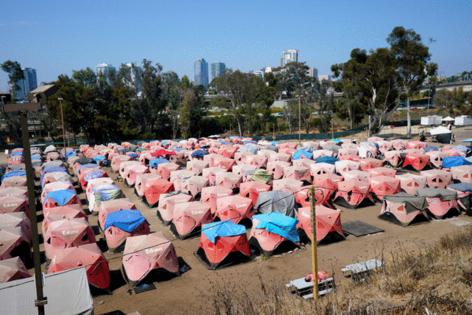Wait, did Trump endorse San Diego's safe sleeping sites for homeless people?
Published in News & Features
During the presidential campaign, Donald Trump pitched an idea to quickly reduce the number of tents on the nation’s streets: Offer up other places for people to camp.
He’d start with a big plot of land. Then his team would hire social workers, psychiatrists and other medical staff which together could “create tent cities where the homeless can be relocated,” he said last year in a video.
That idea might sound familiar. San Diego already has two designated camping areas by Balboa Park where hundreds spend each night in red tents, and the project appears to offer at least one area of agreement between local leaders and the president-elect.
Yet when it comes to other fronts in the fight to end homelessness — including a longstanding housing-first policy, funding for migrants, encampment crackdowns and a local proposal to create what would likely be the nation’s largest shelter — the debates may be more contentious, especially considering the budget deficits facing both California and the city of San Diego.
“Am I concerned about Trump coming in and cutting budgets? Sure,” said Jennifer Nations, managing director of the Homelessness Hub research lab at UC San Diego. “Would it have happened anyway? Maybe.”
Housing First
Trump’s first administration opposed the federal government’s longstanding “Housing First” policy that prioritizes getting people safe places to live before other problems are addressed.
One report from his U.S. Interagency Council on Homelessness called it a failed “one-size-fits-all approach,” yet that declaration didn’t come until October 2020, shortly before Trump lost the election to Joe Biden.
Trump’s more recent homelessness speeches suggest he may revisit a policy overhaul. For “those who are severely mentally ill and deeply disturbed, we will bring them back to mental institutions,” he said.
A growing body of research has found that a lack of affordable housing is the primary driver of homelessness and there is ample evidence that Housing First can work. This is partially why San Diego shelters are generally “low barrier,” meaning sobriety isn’t required, and leaders in Sacramento don’t appear eager to toss California’s own Housing First model.
Nonetheless, Trump could potentially reduce how much money is available for certain housing projects.
One bright side? There might instead be more funding for shelters and treatment programs, said Tamera Kohler, CEO of the Regional Task Force on Homelessness.
“That does meet a need,” she added.
Veterans and migrants
In another video from last year, Trump pledged to redirect money spent on migrants toward citizens who’ve served in the military. “I will make it a personal mission to totally eradicate veterans’ homelessness in America by the end of next term,” he said.
That could mean more funds for housing vouchers, a form of rental assistance credited with reducing veteran homelessness nationwide. However, San Diego County officials have long said there’s not enough federal aid to help those crossing the border get to their final destinations, which are often in other states, and a drop in support might lead to more immigrants ending up on local streets.
Crackdown
Trump’s campaign video also promised a crackdown on encampments. “There is nothing compassionate about letting these individuals live in filth and squalor rather than getting them the help that they need,” he said.
Much of the state appears to agree.
Several cities, including San Diego, have already approved camping bans that boost penalties for sleeping outside, while California voters just passed Proposition 36 to toughen sentences for drug possession. County officials are additionally in the process of implementing Senate Bill 43 to detain more people incapacitated by substance abuse.
Yet there are nowhere near enough beds at traditional shelters or rehabilitation facilities for everyone asking for help, much less those taken against their will, nor is it clear if a president would have much influence over local law enforcement.
San Diego officials directed questions about the federal government’s jurisdiction concerning area encampments to the city attorney’s office, where a spokesperson declined comment.
Sunbreak Ranch
Trump’s comments about “tent cities” were seized upon by proponents of a different homelessness proposal called Sunbreak Ranch, which calls for the creation of a massive campus somewhere in the county that could theoretically serve thousands.
“San Diego is uniquely well-positioned to be the pilot program location,” businessman George Mullen wrote in an email. “And once Sunbreak is proven, it can be rapidly replicated up California and across America.”
The basic idea has been endorsed by a number of local and national leaders, including Ben Carson, Trump’s former secretary of housing and urban development. Critics argue it’s an pipe dream.
Mullen previously pushed to use part of Marine Corps Air Station Miramar, just off Interstate 15, but the site’s commanding officer has said the area likely has too many buried explosives. Nonetheless, Trump’s reelection may raise the odds that federal land is made available for homelessness services.
A spokesperson for Mayor Todd Gloria said they hoped for a good working relationship with the incoming administration.
“We are always open to any realistic solution that helps people,” Rachel Laing wrote in an email. “Certainly, we would welcome more behavioral health resources for those suffering from mental health and substance use disorders.”
Trump does not yet appear to have nominated candidates to lead the U.S. Department of Housing and Urban Development or the interagency homelessness council, both of which could have significant influence over the crisis.
_____
©2024 The San Diego Union-Tribune. Visit sandiegouniontribune.com. Distributed by Tribune Content Agency, LLC.







Comments